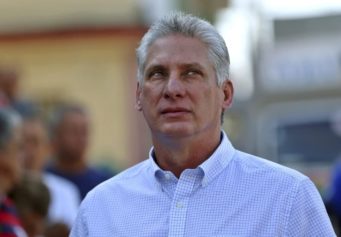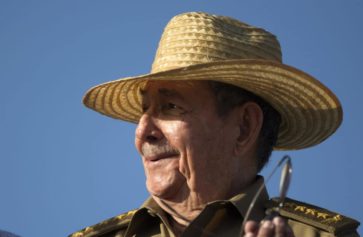The United States and Cuba have been at odds for so long, been engaged in geopolitical and espionage games for so many years, it had become a seemingly permanent part of American culture—until the U.S. and Cuba announced this morning that the two countries will resume full diplomatic relations for the first time in more than 50 years.
The U.S. will open an embassy in Havana, dramatically change travel, banking and remittance restrictions, open up the island to American business—hopefully bringing the Internet to Cuban society—and perhaps with the cooperation of Congress lift the decades-old embargo that was intended to collapse the Castro regime but clearly has not worked.
It represents an extraordinary change in the relationship between the U.S. and its neighbor just 90 miles to the south of Florida.
“We will end an outdated approach that for decades has failed to advance our interests,” the president said in a televised speech to the American people. “And instead we will begin to normalize relations between our two countries. Through these changes, we intend to create more opportunities for the American and Cuban people and begin a new chapter among the nations of the Americas.”
While Obama was speaking to the American people, Cuban President Raul Castro was simultaneously speaking to the Cuban people.
Obama illustrated just how long the chill between the two countries has lasted, pointing out that when he was born in 1963 it was two years after Fidel Castro took power in Cuba and just a few months after the Bay of Pigs invasion, which tried to overthrow his regime.
“Neither the American nor Cuban people are well served by a rigid policy that’s rooted in events that took place before most of us were born,” the president said.
The negotiations between the two sides had been going on for a reported 18 months, with a major issue the prisoners each side was holding onto. President Obama thanked both the Canadian government for hosting the talks and Pope Francis, who hosted a final meeting at the Vatican. The final matters were handled in a 45-minute phone call between Obama and Cuban President Raul Castro, brother of the long-time leader Fidel Castro, who is now 88.
The Cubans returned USAID subcontractor Alan Gross, 65, after five years in a Cuban prison. Gross was not technically part of the prisoner exchanged—he was released on “humanitarian grounds.” The actual swap involved the U.S. sending back three Cuban spies who have been in an American prison since 1981 and the Cuban government returning an American intelligence agent who has been in a Cuban prison for nearly 20 years.
“In exchange for the three Cuban agents, Cuba today released one of the most important intelligence agents that the United States has ever had in Cuba and who has been in prison for nearly two decades,” Obama said. ”
This man, whose sacrifice has been known to only a few, provided America with the information that allowed us to arrest the network of Cuban agents that included the men transferred to Cuba today, as well as other spies in the United States. This man is now safely on our shores.”
As part of the agreement, Cuba will release 53 Cuban prisoners identified as political prisoners by the United States government.
Gross’s sister, Bonnie Rubinstein, was “beyond ecstatic” at the news of his release, her husband, Harold, told the New York Times. “We are extremely grateful that he’s on his way home. It’s been a long ordeal.”
The U.S. has long been accused of hypocrisy—most vociferously by Fidel Castro—for continuing the embargo because of U.S. opposition to what it believed was Cuba’s denial of freedom and human rights for its citizens. But the U.S. has had diplomatic relations with nations whose human rights record was far more questionable than Cuba’s. The president acknowledged as such when he said, “Consider that for more than 35 years, we’ve had relations with China, a far larger country also governed by a communist party. Nearly two decades ago, we reestablished relations with Vietnam, where we fought a war that claimed more Americans than any Cold War confrontation.”
“Nobody represents America’s values better than the American people. And I believe this contact will ultimately do more to empower the Cuban people,” Obama said. “I also believe that more resources should be able to reach the Cuban people. So we’re significantly increasing the amount of money that can be sent to Cuba and removing limits on remittances that support humanitarian projects, the Cuban people and the emerging Cuban private sector.”
The president anticipated that the move would be loudly attacked in some quarters, particularly among older Cuban residents in Florida who have carried a hatred of Castro for most of their lives for a revolution that many saw destroying their families and their way of life.
“To those who oppose the steps I’m announcing today, let me say that I respect your passion and share your commitment to liberty and democracy,” he said. “The question is how we uphold that commitment. I do not believe we can keep doing the same thing for over five decades and expect a different result. Moreover, it does not serve America’s interests or the Cuban people to try to push Cuba towards collapse. Even if that worked—and it hasn’t for 50 years—we know from hard-earned experience that countries are more likely to enjoy lasting transformation if their people are not subjected to chaos.”
Senator Robert Menendez, Democrat of New Jersey and the chairman of the Foreign Relations Committee, a son of Cuban immigrants who has long been an outspoken critic of the Castro regime, said, “Let’s be clear, this was not a ‘humanitarian’ act by the Castro regime. It was a swap of convicted spies for an innocent American.”
“President Obama’s actions have vindicated the brutal behavior of the Cuban government,” he added.
Senator Marco Rubio of Florida, considered a prospect for the 2016 Republican presidential nomination, tread more carefully when he told The Associated Press: “This is going to do absolutely nothing to further human rights and democracy in Cuba. But it potentially goes a long way in providing the economic lift that the Castro regime needs to become permanent fixtures in Cuba for generations to come.”
The Times said the contractor, Gross, first went to Cuba to deliver satellite telephone equipment that had the capability of cloaking connections to the Internet when he was arrested in 2009 by Cuban authorities who tightly control access to the Internet in their country. Accused of being a spy, Gross was convicted in a Cuban court of bringing in the devices without a permit as part of a subversive plot to “destroy the revolution.”
According to published reports, the American government has spent $264 million over the last 18 years to spur democratic change in Cuba—to no avail. Just this week, stories emerged that the U.S. intelligence for the last two years had been actually trying to overthrow the Cuban government by using Cuban rappers to spark an anti-government movement—but the Cuban government learned of the plot and shut it down.


